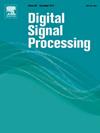Convergence-enhanced 1-bit DACs precoding for massive MIMO-OFDM systems via Anderson acceleration
IF 3
3区 工程技术
Q2 ENGINEERING, ELECTRICAL & ELECTRONIC
引用次数: 0
Abstract
In the downlink of massive multiple-input multiple-output (MIMO) systems, high-resolution digital-to-analog converters (DACs) are a major source of power consumption. This paper mainly focuses on the precoding design for the downlink of massive MIMO-orthogonal frequency division multiplexing (OFDM) systems employing 1-bit DACs to reduce power consumption. We propose a Douglas-Rachford splitting (DRS)-based 1-bit precoding algorithm, where operator linearization is adopted during iterations to avoid matrix inversion, thereby reducing computational complexity. To enhance convergence efficiency, we demonstrate that the proposed precoding algorithm is a fixed-point iteration and introduce an Anderson acceleration module, developing an Anderson acceleration linearized DRS (LDRS-AA) precoding algorithm. Notably, we introduce a decision function to improve the stability of classical Anderson acceleration. A detailed analysis of the convergence and computational complexity for the proposed algorithms is also provided. Simulation results show that the proposed Anderson acceleration scheme achieves significant convergence speed improvement without performance loss. In addition, the proposed precoding algorithm achieves superior bit error rate (BER) performance, exhibiting approximately 1.25 dB and 1 dB performance gains over existing advanced algorithms under quadrature phase shift keying (QPSK) modulation and 16-ary quadrature amplitude modulation (QAM), respectively.
基于Anderson加速的大规模MIMO-OFDM系统的收敛增强1位dac预编码
在大规模多输入多输出(MIMO)系统的下行链路中,高分辨率数模转换器(dac)是一个主要的功耗来源。本文主要研究采用1位dac的大规模mimo -正交频分复用(OFDM)系统下行链路的预编码设计,以降低系统功耗。我们提出了一种基于DRS (Douglas-Rachford splitting)的1位预编码算法,该算法在迭代过程中采用算子线性化来避免矩阵反转,从而降低了计算复杂度。为了提高收敛效率,我们证明了所提出的预编码算法是一个不动点迭代,并引入了Anderson加速模块,开发了一种Anderson加速线性化DRS (LDRS-AA)预编码算法。值得注意的是,我们引入了一个决策函数来提高经典安德森加速度的稳定性。对所提出算法的收敛性和计算复杂度进行了详细的分析。仿真结果表明,提出的Anderson加速方案在不损失性能的前提下,显著提高了收敛速度。此外,所提出的预编码算法具有优越的误码率(BER)性能,在正交相移键控(QPSK)调制和16进位正交调幅(QAM)调制下,分别比现有的先进算法性能提高约1.25 dB和1 dB。
本文章由计算机程序翻译,如有差异,请以英文原文为准。
求助全文
约1分钟内获得全文
求助全文
来源期刊

Digital Signal Processing
工程技术-工程:电子与电气
CiteScore
5.30
自引率
17.20%
发文量
435
审稿时长
66 days
期刊介绍:
Digital Signal Processing: A Review Journal is one of the oldest and most established journals in the field of signal processing yet it aims to be the most innovative. The Journal invites top quality research articles at the frontiers of research in all aspects of signal processing. Our objective is to provide a platform for the publication of ground-breaking research in signal processing with both academic and industrial appeal.
The journal has a special emphasis on statistical signal processing methodology such as Bayesian signal processing, and encourages articles on emerging applications of signal processing such as:
• big data• machine learning• internet of things• information security• systems biology and computational biology,• financial time series analysis,• autonomous vehicles,• quantum computing,• neuromorphic engineering,• human-computer interaction and intelligent user interfaces,• environmental signal processing,• geophysical signal processing including seismic signal processing,• chemioinformatics and bioinformatics,• audio, visual and performance arts,• disaster management and prevention,• renewable energy,
 求助内容:
求助内容: 应助结果提醒方式:
应助结果提醒方式:


